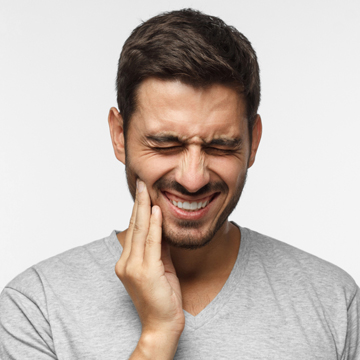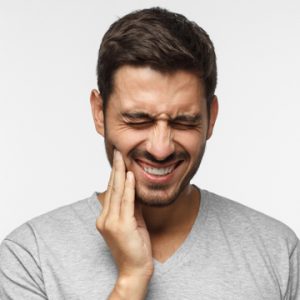
 San Francisco, Marin, and Oakland, CA
San Francisco, Marin, and Oakland, CA
Jaw pain is common. In most cases, this pain is due to a dysfunction with the temporomandibular joint, which is a small, round joint connecting the lower jaw to the skull. You may experience jaw pain occasionally, or your pain may be chronic. How can you tell what is causing your pain? We would like to share the most common causes of jaw pain. Our neuromuscular dentists in the Bay Area also offer medication-free treatment options to get you out of pain once and for all.
Jaw Pain Causes
TMD, otherwise known as temporomandibular joint disorder or TMJ disorder, affects more than 10 million Americans at any given time, according to the National Institute of Dental and Craniofacial Research. This disorder can develop for many reasons: excessive stimulation to the jaw, a displaced disc, or arthritis. However, an injury or another type of trauma to the jaw may be the most commonplace cause. This damage may result from bruxism, the clinical term for teeth clenching and grinding, which often occurs at night while sleeping. Primary care physicians may diagnose TMJ disorder because it presents a variety of symptoms.
Cluster headaches are another cause of jaw pain. This type of headache traditionally starts behind one eye and then radiates out to other areas—including the jaw. Cluster headaches are known as, arguably, the most painful type of headache.
Sinus problems can lead to jaw pain. Excess mucus causes swelling within the sinus cavities, which places undue pressure on your jaw—thus creating the sensation of pain.
Tooth pain can traumatize the jaw if not dealt with properly and promptly. This pain could be caused by damage, decay, or a severe infection that leads to an abscessed tooth.
Trigeminal neuralgia is a condition that occurs when the trigeminal nerve, which provides sensation to most of your face and transmits a significant amount of sensory information, is compressed. This compression will create pain in various regions of the face, including both jaws.
Heart attacks can cause pain in various regions of your body: the chest, arms, back, neck, and jaw. It is more likely to cause jaw pain in women on the left side of their face, but that does not mean that men will not also experience it. If you believe you may be suffering the symptoms of a heart attack, you should not wait to contact your dentist, but rather call 911 immediately.
Get relief for your jaw pain
For temporary relief from your jaw pain, we recommend applying moist heat or ice packs to your face for 10 minutes at a time. Alternatively, you may run warm water over a washcloth and apply it to your face in a similar fashion. In congruence with moist heat and ice, you may also take over-the-counter pain relievers such as ibuprofen and acetaminophen, which can help reduce the pain. Many patients with jaw pain have success with massaging their jaw joints as well. To do this, place your index and middle finger over your jaw joint and massage in circular motions. To achieve the best results, make five to 10 rotations with your fingers, then open and close your mouth. Repeat as necessary to relieve pain. Depending on the cause of your pain, having your temples and neck messaged may be an alternative method for alleviating the stress on your jaw. These, however, are all temporary remedies until the root cause of your jaw pain is identified and treated.
Treating jaw pain in San Francisco
If you’re suffering from jaw pain and live in the areas of San Francisco, Oakland, and Marin in California, then you should contact our office immediately. Glen Park Dental’s highly-trained staff includes multiple specialists in neuromuscular dentistry, which emphasizes the alignment of the bite and jaw. Finding your ideal neuromuscular jaw position is paramount when evaluating a case of jaw pain before any treatment begins. Don’t let your jaw pain become constant or debilitating. Contact our office at (415) 585-1500 to schedule your consultation.


